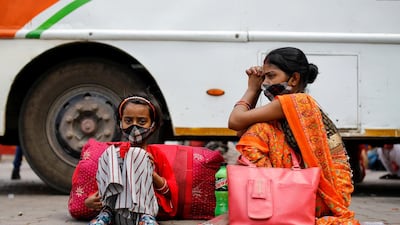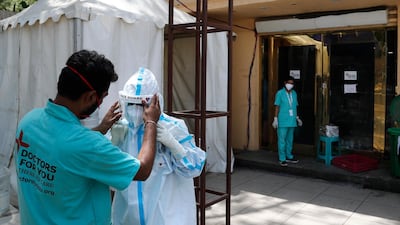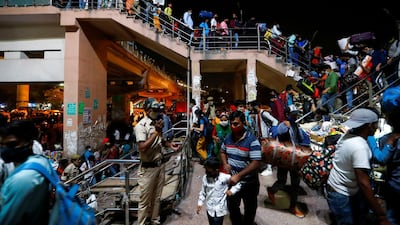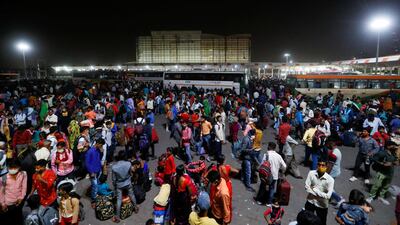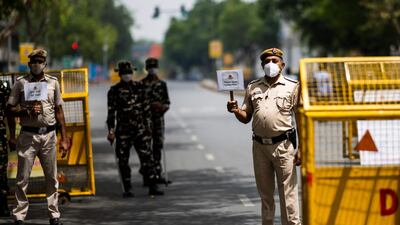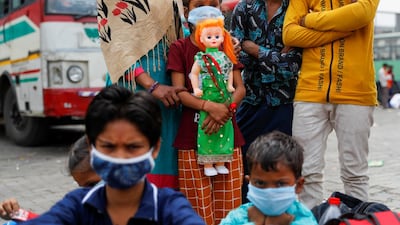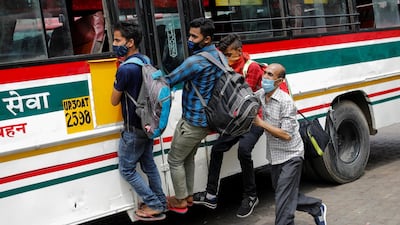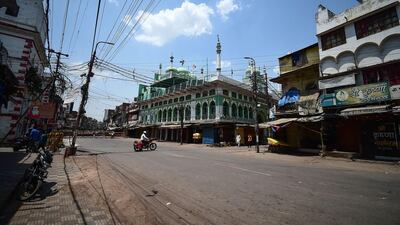Related: Covid-19 surge risks derailing India's global vaccine manufacturing drive
Indians in the UAE have told of their concern for families back home after an "alarming" surge in Covid-19 cases.
With India in the grips of a deadly second wave, officials have sought to stem soaring infection rates by introducing stricter stay home restrictions in several states, including major cities such as Delhi and Mumbai.
But experts said complacency had set in with varying rules in different states.
Many Indians are going ahead with large weddings and family gatherings with overseas visitors on guest lists.
After New Delhi capped the number of guests at 50 and recently enforced night curfew, Indian media reported how families moved festivities to neighbouring Gurugram where 200 people can gather indoors and up to 500 outdoors.
'People became careless'

“People have been travelling from the UAE to India and many were attending gatherings," said Ana Siddiqui, a health insurance worker in Dubai.
“They became really careless. If people had followed rules and avoided gatherings, this would not have happened.”
She said she was concerned for her parents and family in Aligarh, in northern India’s Uttar Pradesh state.
“The rise in cases is alarming and disturbing,” she said.
'Every day I hear of someone I know dying'
Sana Akhir, an Indian resident in Sharjah, struggles to sleep at night because she knows people who have succumbed to Covid-19.
Ms Akhir, who is from Mumbai, gets messages from people struggling to find hospital beds and in need of oxygen cylinders.
“Every day I get news of someone I know dying due to Covid-19. I feel scared that I might wake up to the news that someone else has passed away,” said Ms Akhir.
“Many people in my extended family have contracted Covid-19 in the second wave.

“I am not able to sleep at night and keep checking my phone to see if there is news about how my family members are doing.”
Suresh Kakani, additional municipal commissioner of Mumbai's municipal corporation, told The National, that the city was freeing up more beds.
Mumbai has enforced severe restrictions on movement of people from April 18 until May 1.
"We are on alert," he said.
“Of course it is a concern but it is not a cause for worry because we have put all our systems on high alert. We will not sit back, we have to chase the virus aggressively.
“Just a lockdown will not work. We have to aggressively increase testing, chase the patient, shift him to a quarantine centre or hospital or ensure the home situation is really working."
India’s total number of cases has crossed 15 million, surpassing Brazil and making it the world’s second highest total after the US.
It recorded a rising trend of 259,170 new cases and 1,761 deaths in the past 24 hours.
The UK has placed India on a travel red-list and Prime Minister Boris Johnson cancelled a trip to India next week.
Hong Kong too said it would suspend flights from India, Pakistan and the Philippines for two weeks from Tuesday.
Break the chain of infection
Mr Kakani said abiding by travel rules was key.
“We must try to break the chain. Collectively these rules to break the cycle of the virus are in the larger public interest,” he said.
“I may be worried that my family member cannot travel to these countries but I must realise that he may be a carrier or super spreader."
















Poor messaging by the federal government has also been blamed with the ruling Bharatiya Janata Party criticised after Prime Minister Narendra Modi addressed crowded election rallies and devotees were permitted to congregate at a religious Kumbh festival in northern India.
India has administered more than 127 million vaccine doses – the highest in the world after the United States and China.
More than 3.2 million vaccine doses were administered in the last 24 hours.
The country aims to cover 250 million people by July but needs to move quicker.
Closing in on clusters
Sundararaman, co-ordinator of the New Delhi-based People's Health Movement that works with grass-roots activists, said regional elections and the religious gathering were not solely responsible for the surge.
“Many places where there is a peak like Mumbai, Mahrashtra, Delhi did not have elections. What we need is to increase disease surveillance,” he said.
“We need to identify clusters early and take action to suppress [them].
“There is also weakness in terms of community co-operation. There has been a premature relaxation on too many fronts.”
The government last week allowed the use of vaccines approved by the World Health Organisation and regulators in the US and Europe.
This will add to two vaccines currently administered, Covishield – the local name for the Oxford-AstraZeneca vaccine manufactured in India – and home-grown Covaxin.
The plan will open up the market, free up procurement at the state level and boost availability.
Mr Sundararaman said this was desperately needed.
“Currently we are vaccinating 3 to 4 million people daily but we need to vaccinate at least 8 million daily to make a difference,” he said.
“Increasing outreach so more people take the vaccine and scaling up manufacturing will be important.”
